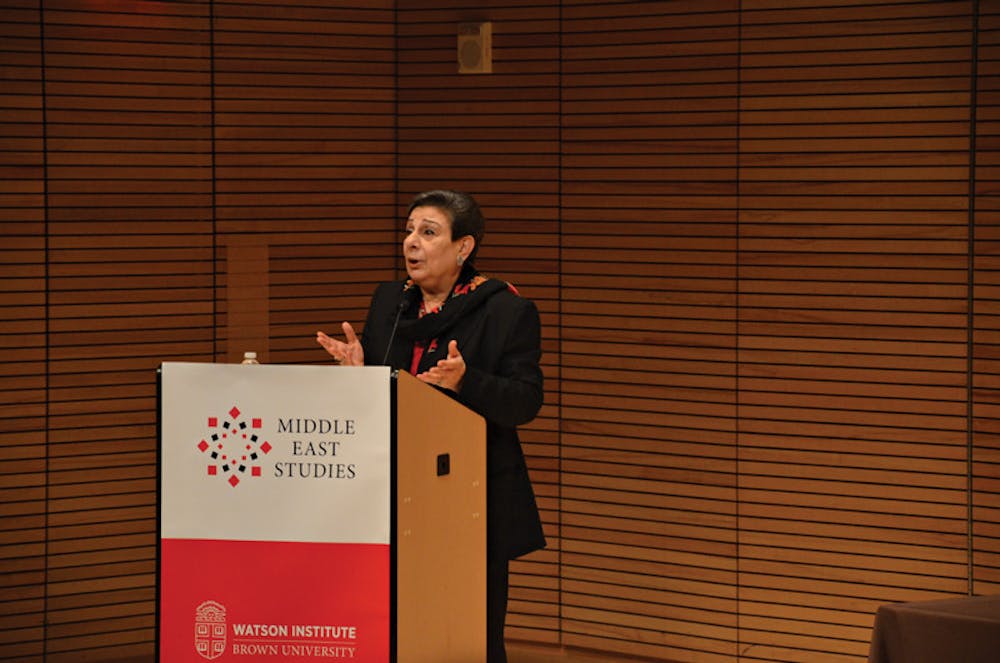“When it comes to Palestine, the laws of physics do not apply. You cannot say that for every action there is an incurrent opposite reaction,” said Hanan Ashrawi, a Palestinian legislator, activist and scholar to a crowded Perry and Marty Granoff Center for the Creative Arts Thursday evening.
Ashrawi is among a group of panelists who presented at “What is to be Done?” — the fourth in a series of discussions about the Israeli-Palestinian conflict held by the Department of Middle East Studies and co-sponsored by the Watson Institute for International Studies.
Director of Middle East Studies Beshara Doumani introduced the panel, which also included Chancellor Emeritus Stephen Robert ’62 and Hani Masri, director general of Masarat, the Palestinian Center for Policy Research and Strategic Studies. Ilan Pappé, director of Exeter University’s European Centre for Palestine Studies, was also a slated panelist but did not attend due to a flight delay.
Doumani emphasized the panelists’ expertise in Middle Eastern issues, particularly Ashrawi. “She’s an elected representative of the Palestine Representative Council, representing Jerusalem,” he said, adding that Ashwari was the first woman to join the Palestine Liberation Organization’s executive committee.
“In the overall configuration of Middle East peace, Palestine is actually the weakest, the most vocal component. We are always being asked to think creatively, to think outside of the box, to find ways out of an impasse, to try to find strategic options,” Ashrawi said. “Although we know we are not in control of what’s happening around us, the Palestinian question has never been an isolated, discrete issue. It has always been several external factors and powers.”
Ashrawi said Israel has increased its settlement activity and sent the message to the rest of the world that it does not want a two-state solution or peace.
“Israel is holding back (Palestine’s) funds, so that there is a severe financial crisis. So Palestine doesn’t really have any budget to work with right now,” Ashrawi said. “There is a chance of imminent collapse. It’s not just the money — I think it’s an incremental process.”
Ashrawi said that after the latest attack on Gaza, a ceasefire was negotiated by Egypt. But that ceasefire was supposed to be followed by other steps, and Palestine has not seen any initiatives taken.
Ashrawi denounced the United States’ continuous support of Israel. “It has undermined the integrity of the peace process; it has enabled Israel to persist with its violations and policies. Therefore, if there is to be real peace, the U.S. has to take a critical stance,” she said.
In exploring the solutions to Palestine’s current predicament, Ashrwai stressed that self-empowerment is essential against external pressure. She said the PLO has adapted a series of initiatives, including accepting international treaties and applying to the United Nations Human Rights Council. The PLO is redefining Palestine’s authority, institutions and laws, all of which will eventually shape the nature of Palestine and enable it to become a part of the international community, she said. Ashrawi also addressed the division between Hamas and the PLO, adding that this rift needs to be healed “to serve the national cause.”
Robert tackled the debate from the perspective of an American Jew. He condemned what he perceives as Israel’s persecution of Palestinians and appealed for change in Israeli politics.
“It’s painful to say, but in my view, Israel is no longer a democratic Jewish state. It’s basically a binational state, with 35 percent of the population with no rights at all, and the other 65 percent have every right,” Robert said.
Israel has no chance of peace without a new government, he said. The current government will not engage in negotiations and will only exacerbate the situation. The will to implement proposed agreements is crucial, he added.
“All you need is an Israeli administration that will seriously negotiate peace,” Robert said.





